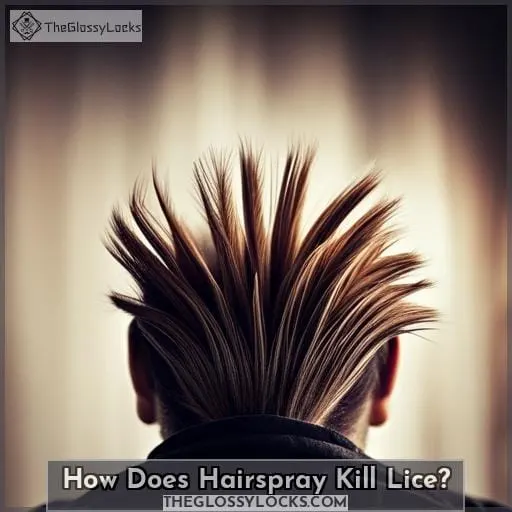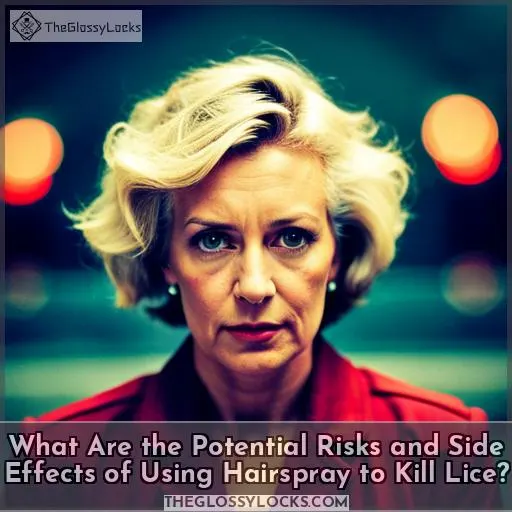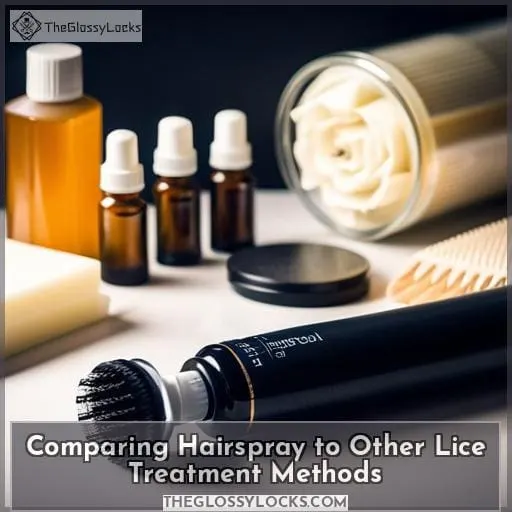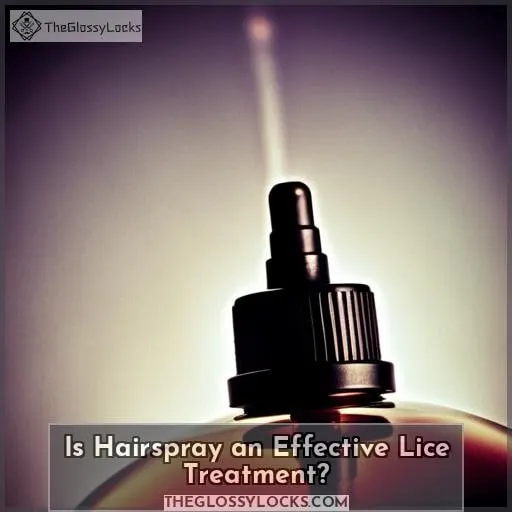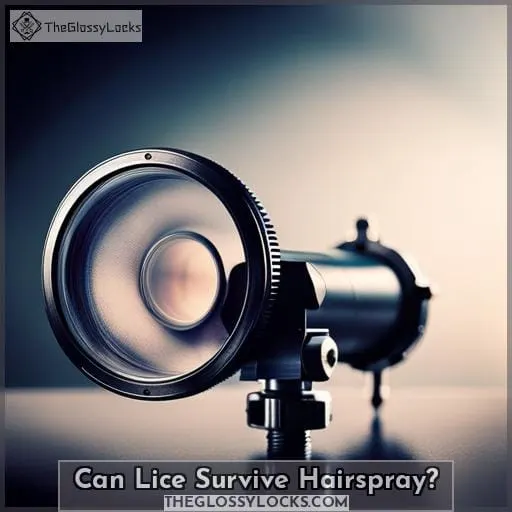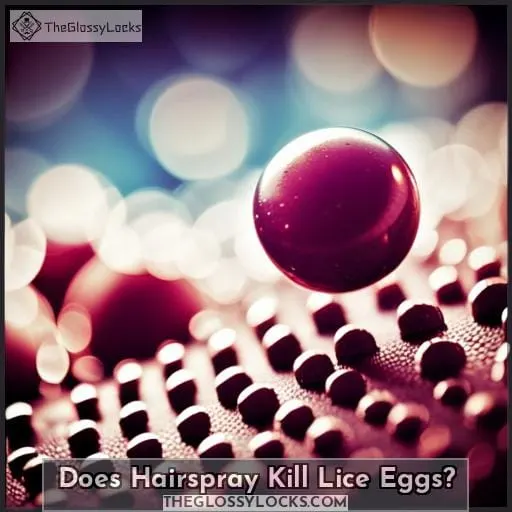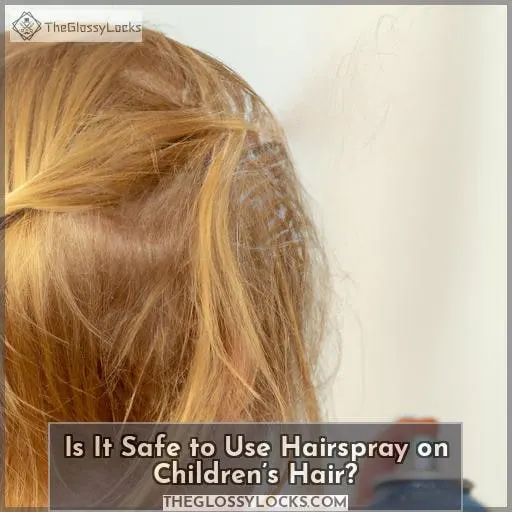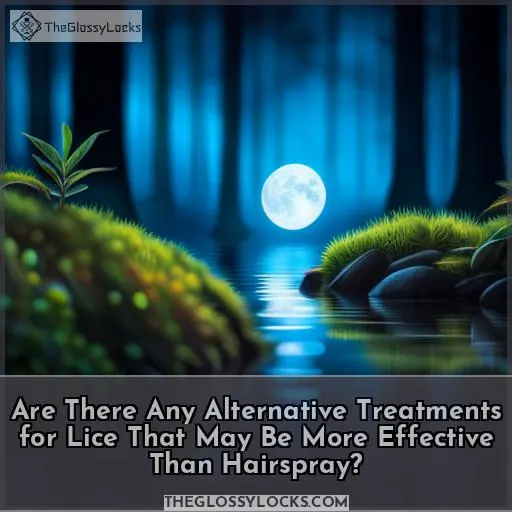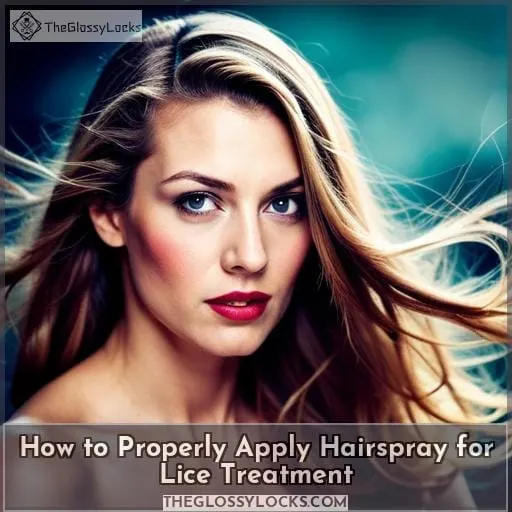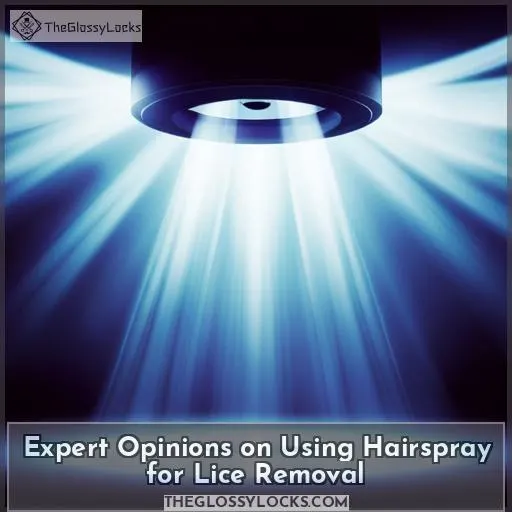This site is supported by our readers. We may earn a commission, at no cost to you, if you purchase through links.
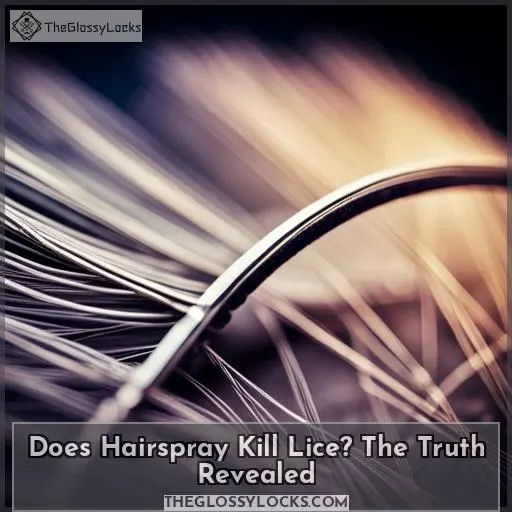 Tired of dealing with a never-ending lice infestation? You’re not alone! If you’ve been struggling to get rid of those annoying parasites, then you may have heard that hairspray can help kill lice.
Tired of dealing with a never-ending lice infestation? You’re not alone! If you’ve been struggling to get rid of those annoying parasites, then you may have heard that hairspray can help kill lice.
In this article, we’ll explore the truth behind whether or not using hair spray kills lice and provide tips on how to properly apply it. We’ll also compare it to other methods and look at potential risks associated with using hair spray as a treatment option.
So let’s dive in and get all your questions answered about does hairspray kill lice – once and for all!
Table Of Contents
- Key Takeaways
- How Does Hairspray Kill Lice?
- What Are the Potential Risks and Side Effects of Using Hairspray to Kill Lice?
- Comparing Hairspray to Other Lice Treatment Methods
- Is Hairspray an Effective Lice Treatment?
- Can Lice Survive Hairspray?
- Does Hairspray Kill Lice Eggs?
- Is It Safe to Use Hairspray on Children’s Hair?
- Are There Any Alternative Treatments for Lice That May Be More Effective Than Hairspray?
- How to Properly Apply Hairspray for Lice Treatment
- Expert Opinions on Using Hairspray for Lice Removal
- Conclusion
Key Takeaways
- Hairspray can be considered as a potential lice treatment, aiming to suffocate lice and eggs by clogging their respiratory system.
- The effectiveness of hairspray as a lice treatment varies based on the type and stage of lice, and it may not reliably kill lice eggs.
- Hairspray poses risks and limitations, including flammability, potential allergic reactions and itching, toxicity of ingredients, and scalp and hair damage.
- Alternative approaches such as natural remedies and over-the-counter shampoos are available and should be considered, with professional consultation recommended for making decisions.
How Does Hairspray Kill Lice?
You may have heard of hairspray as a potential solution to pesky lice, but do you know how it works? The idea behind using hairspray is that it will act as a suffocation mechanism for the lice and eggs.
This method relies on the chemical composition of the product clogging up their respiratory system, ultimately leading to death.
Although this could be an effective treatment option in theory, there are always risks involved with any kind of infestation remedy. For one thing, there is no guarantee that this type of application technique would be effective in killing all types or stages of lice infestations.
Some experts believe they can build up resistance over time against such treatments like hairspray, which might limit its comparative effectiveness relative to other solutions like prescription medications or special shampoo products designed specifically for treating these kinds of scalp issues.
In addition to possibly being ineffective at times when trying to combat louse invasions with hair products alone, these treatments also come along with certain hazards associated with them having flammable properties and possible allergic reactions if applied too liberally across areas where skin contact occurs frequently, such as neck regions, etc.
So caution should definitely still be exercised when attempting such measures, regardless of whether you decide to go ahead and opt for OTC remedies or seek out professional consultation instead.
What Are the Potential Risks and Side Effects of Using Hairspray to Kill Lice?
Using hairspray to kill lice may come with potential risks and side effects, including the toxicity of its ingredients, scalp and hair damage due to dryness, allergies or itching caused by harsh chemicals, as well as flammability.
Therefore, it is important to exercise caution when using this method for lice treatment.
Toxicity of Hairspray Ingredients
It’s important to consider the toxicity of ingredients used in hairspray, as they can have a powerful impact on lice, almost like a sledgehammer. The chemical composition of hairspray can lead to health implications when inhaled or when it comes into contact with the skin.
Additionally, these chemicals can have environmental impacts when they are washed away and enter waterways.
Hairspray should only be used as a last resort after exploring other less toxic options, such as over-the-counter shampoos and prescription treatments that have been proven effective against lice transmission.
It is also essential to take additional preventive steps, such as avoiding sharing items with others who are infested with lice and regularly screening for early detection of any signs of new outbreaks.
Scalp and Hair Damage
Using hairspray to combat lice infestations can result in scalp and hair damage, leaving you with dryness, itching, and potential allergies. Hair spray formulas contain evaporating solvents that disrupt the moisture balance on the scalp, leading to irritation.
Regular use of hairspray may also cause breakage or hair fall due to weakened strands from drying agents present in its composition. Moreover, it is not effective against lice eggs as most of them attach tightly, making it difficult for suffocation methods like using hairsprays, which will only make them stick more firmly.
Therefore, special care must be taken while opting for any kind of treatment involving chemical-based products. Styling after treatment should be strictly avoided to ensure safety against further damages caused by lice infestation.
Additionally, there is minimal risk involved during treatments involving the use of hazardous ingredients like those present in a regular bottle of hairspray.
Allergies and Itching
Additionally, when using hair spray for lice treatment, there is a risk of developing an allergic reaction or itching on the scalp due to potential irritants in the product. Studies have found that up to 10% may be sensitive to at least one allergenic ingredient.
Scratching triggers further discomfort and can lead to skin inflammation or infection if left untreated. Managing allergies effectively requires careful avoidance of hairspray and other products that contain similar ingredients, as well as prompt medical attention if symptoms occur.
Lice infestation carries with it numerous risks, including those associated with allergies and itching. However, proper prevention measures can significantly reduce these risks by eliminating exposure before they begin.
Flammability
Beware: the use of hairspray to treat lice infestations can be risky, as it can increase the flammability of your hair. Hairspray contains chemicals and solvents that may cause scalp damage or allergic reactions.
Additionally, excessive exposure to these toxins could also lead to potential fire hazards if ignited on contact with open flames or sparks. Therefore, alternative treatments such as specialized shampoos and medications should be considered for effective lice removal.
Comparing Hairspray to Other Lice Treatment Methods
When it comes to treating lice, there are several effective methods available. Over-the-counter (OTC) shampoos and prescription medications can both be used for successful treatment.
Over-the-Counter Shampoos
Over-the-Counter shampoos provide an affordable and effective alternative to harsh chemicals, such as hair spray, for treating lice infestations. These products contain active ingredients that can kill both adult lice and nits without the worry of developing resistance.
The application techniques are straightforward – you simply massage the shampoo into your scalp before rinsing it off after 10 minutes or so. Following this method will ensure maximum effectiveness in eliminating a lice infestation within a few treatments over several weeks duration.
OTC shampoos have been proven to be a reliable way of getting rid of head lice when used correctly with proper hair care tips like using conditioner regularly afterwards to avoid dryness caused by their chemical components.
Additionally, these products come at much lower costs than prescription medications which makes them attractive options for those looking for quick relief from pesky parasites with minimal financial strain on their budgets.
Prescription Medications
If you think lice are a drag, then prescription meds can be the ultimate buzzkill! Prescription medications have been proven to effectively kill lice and their eggs. However, potential side effects should also be considered before using these treatments.
Pediatric safety is especially important when considering prescription medication for children. Alternative treatments such as medicated shampoos and essential oils may provide an effective alternative with fewer risks than traditional prescription drugs.
Expert recommendations suggest that over-the-counter products combined with hair spray or other topical medication could prove successful in treating persistent cases of head lice infestations without the need for costly prescription drugs or medical intervention from a doctor or pharmacist.
Ultimately, it’s best to seek professional advice before attempting any form of treatment on your own – whether that includes hairspray, medicated shampoos, essential oils, and/or prescribed medications – as this will ensure the most reliable solution tailored specifically for your individual needs while minimizing the risk of complications during treatment.
Is Hairspray an Effective Lice Treatment?
Considering the potential risks and effectiveness, you may wonder if hairspray is a reliable lice treatment. While it can be used as an alternative to traditional treatments, its efficacy has been debated due to varying results.
Hairspray works by suffocating the parasitic insects on contact but this method can become less effective over time as some lice develop resistance. Furthermore, there are concerns about pediatric safety when using aerosols near children’s scalps and hair health with frequent applications of hairspray — both issues that must be taken into account when looking at other treatments or home remedies for lice infestations.
Though OTC shampoos have been deemed more effective than home remedies in killing live bugs quickly without causing adverse reactions on skin or scalp, prescription medications often provide stronger solutions compared to non-prescription products while being cost-effective in most cases too.
The Centers for Disease Control also advises combining multiple methods such as shampooing plus combing against nits after application; however, these strategies should always take into consideration possible resistances from certain species of head lice before implementation since they could prove ineffective depending on various factors like topical use or environmental conditions present during outbreaks among others.
Ultimately, your best bet is consulting a professional who will guide you through making the right decision that suits your needs based upon their expertise concerning parasites’ behavior patterns so you get back healthy hair soon enough!
Can Lice Survive Hairspray?
The effectiveness of hairspray as a lice treatment is often questioned. But can the insect survive this method? To answer that, it’s important to understand how the product works. Hairspray contains ingredients such as alcohol and resins, which create a coating on hair strands.
However, there are certain risks associated with using this method. Firstly, there is the potential for hair damage caused by the drying effects of hairspray. Secondly, allergic reactions may occur due to the strong chemicals present in the product.
Lastly, there is a risk of flammability when hairspray is used near open flames or sparks.
In comparison to other treatments like nit-combing and over-the-counter (OTC) shampoos, hairspray isn’t always reliable. Some lice species may be resistant to it or could simply move away from areas sprayed with the product until they are no longer affected by its fumes.
This can make it difficult to completely remove the lice if hairspray is not combined properly with another form of prevention, such as medicated shampoo or hair gel containing dimethicone oil.
Despite these limitations, many people still prefer using hairsprays to treat their kids’ head lice due to its affordability and ease of use. However, caution must still be exercised, especially since there could still be potential allergic reactions even after thorough washing off post-application.
Therefore, consulting a doctor before trying out any home remedy is highly advised for maximum safety precaution purposes.
Does Hairspray Kill Lice Eggs?
You may have heard that using hairspray can help in the battle against lice, but does it really take care of those pesky eggs? Unfortunately, hairspray is not effective when it comes to killing lice eggs or nits.
While hairspray can be useful for suffocating adult lice by clogging their breathing apparatus and causing them to die from lack of oxygen, this method will not work on the smaller and more resistant egg form.
In fact, research has shown that most over-the-counter (OTC) solutions are also ineffective at killing nits since they often don’t contain enough pesticide residue to penetrate through the hard outer shell encasing these tiny eggs.
Instead, experts recommend using a nit comb alongside an OTC shampoo or prescription medication as an effective way to remove both live bugs and their attached egg casings from your child’s head completely.
However, caution should still be exercised when applying hairspray due to its potential drying effects on the skin/scalp area, as well as flammability risks if applied near open flames or sources of heat.
Ultimately, seeking professional advice is always best for any kind of treatment involving lice infestation – whether you decide to use traditional methods like haircare products/medication combinations with nit combs or a newer approach such as freezing treatments.
Is It Safe to Use Hairspray on Children’s Hair?
Although using hairspray as a lice treatment might seem like an easy solution, it’s important to consider the potential risks before applying it to children’s hair. Hairspray can be harsh and drying on delicate scalps, potentially causing irritation or even allergic reactions.
Additionally, there are safety concerns for younger users due to the flammability of some products containing alcohol and other ingredients found in hairsprays.
There are non-toxic alternatives that are age-appropriate solutions for lice control in children’s hair care routines. Pediatrician recommendations lean towards natural remedies such as combing with special nit combs designed specifically for this purpose or using essential oils like tea tree oil diluted with shampoo to remove lice.
If these methods fail, professional help should be sought. If chemical treatments must still be used, safe solutions such as over-the-counter shampoos specially formulated against lice infestations may prove more effective than simply spraying hairspray on a child’s hair every day before bedtime.
In today’s market, there are many different types of specialized hair products available both online and at drugstores. These products contain active ingredients aimed at eliminating head lice quickly yet safely without harming a child’s health.
Are There Any Alternative Treatments for Lice That May Be More Effective Than Hairspray?
Considering the risks and limited reliability associated with using hairspray to treat lice infestations, there are more effective alternative treatments for dealing with these pesky pests.
Natural remedies such as essential oils or herbal solutions can be used in combination with professional treatments for better results. For example, a hair care regimen that involves thorough combing of the scalp and use of lice reduction shampoo may reduce lice populations significantly when combined with other methods like natural oil applications.
Home remedies have been known to work on some occasions; however, their effectiveness is not always guaranteed due to variability in ingredients used and the difficult application process involved.
The most reliable treatment option is still through prescription medications, but it should only be considered after consulting a doctor or healthcare provider who can assess an individual’s unique situation before recommending any type of medication-based solution.
When choosing which method(s) to use against lice infestation, consider both safety concerns as well as how long each method will take given the stages present in a single life cycle (eclosion/hatching phase).
Combining different approaches at once may help increase success rates while also helping ensure that all eggs are eliminated from affected areas quickly, preventing further spread from occurring afterwards.
How to Properly Apply Hairspray for Lice Treatment
To effectively treat lice, you must properly apply hairspray while avoiding risks such as dryness and allergies.
Start by applying a generous amount of hairspray onto affected hair strands from root to tip, being careful not to miss any areas where lice may be present or eggs may have been laid.
Use a gentle massage motion with your fingertips when applying the product in order for it to penetrate through the hair follicles and skin more evenly. This will also help break up any built-up residue on the scalp or other body parts that might prevent complete coverage of the treatment area during the application process.
Leave on for at least 30 minutes before rinsing out thoroughly with warm water. This ensures that all traces of hairspray are removed completely so there is no risk of further irritation due to itching caused by lingering product particles left behind after the rinse-off period has passed (longer than 10 minutes).
Comb wet/dampened hair using a special wide-tooth comb designed specifically for removing lice eggs (also known as nits), which can remain attached firmly even after the initial shampooing stage but can easily come away once treated with continued application over time.
Finally, review biology information regarding lifecycle stages and transmission patterns associated with the particular species type currently affecting individuals involved in order to understand better how best to proceed to the next step forward towards a full elimination success rate via the use of prescription medications, home remedies, natural solutions, etc.
Expert Opinions on Using Hairspray for Lice Removal
Experts suggest considering the effectiveness, cost, and potential risks when deciding on a lice removal method. Hair spray suffocation is one alternative approach that some experts recommend for its affordability and ease of use.
However, it has limited reliability in killing all nits or completely removing adult lice from the head.
Hairspray can be used to coat the hair with an oily film, which clogs breathing pores of both live lice and their eggs (nits). The insect-killing effect is short-lived as hairsprays contain alcohols that evaporate quickly, leaving behind little residue to provide protection from re-infestation over longer duration periods like other products such as Lice Shield or Lice Combat shampoos do.
Though this approach may sound attractive due to its low-cost factor, there are potential risks associated with using aerosolized products near your eyes, nose, mouth, etc., making professional advice necessary before trying out any home remedies like hairsprays for removing head louse infestations effectively without causing further damage either through skin dryness or allergies caused by chemicals present in certain brands of hairspray, including those containing pyrethrin/piperonyl butoxide combinations found in LICE LOGIC shampoo, etc.
Therefore, it’s best not only to consider expert recommendations regarding how you apply these types of treatments but also to consult a healthcare provider if required, especially when dealing with more stubborn forms of infestations where alternative approaches might need to be considered instead.
Conclusion
Using hairspray to kill lice can be a cheap and easy solution, but it’s not always effective and presents some risks. The ingredients in hairspray can be toxic for the scalp and hair, and may cause allergies and itching.
Over-the-counter shampoos and prescription medications may be more effective than hairspray, but they are also more expensive. If you decide to use hairspray, it’s important to do so with caution and follow the instructions properly.
However, it’s recommendable to seek professional advice to ensure the best treatment for lice infestations.
Therefore, it’s important to consider all the risks before using hairspray to kill lice.

